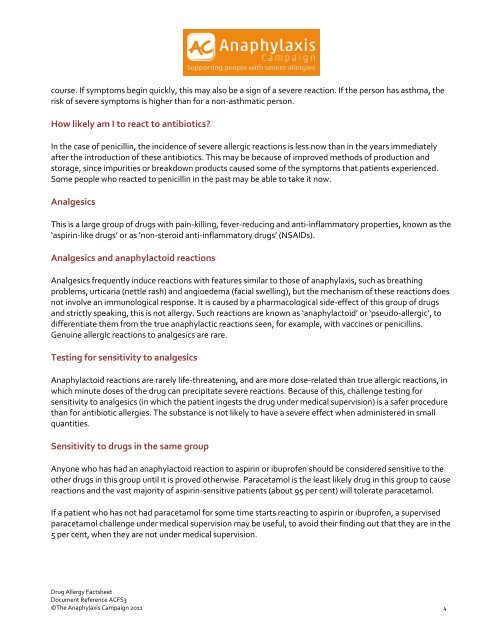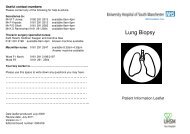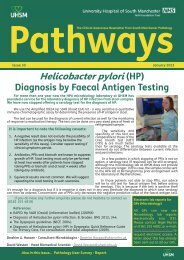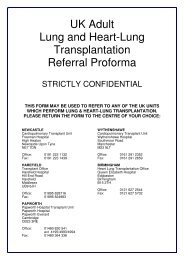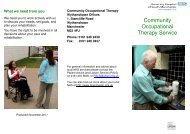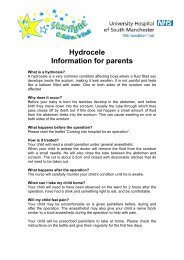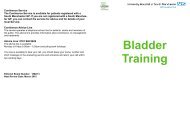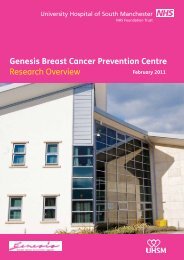Drug Allergy – the facts - Anaphylaxis Campaign
Drug Allergy – the facts - Anaphylaxis Campaign
Drug Allergy – the facts - Anaphylaxis Campaign
You also want an ePaper? Increase the reach of your titles
YUMPU automatically turns print PDFs into web optimized ePapers that Google loves.
course. If symptoms begin quickly, this may also be a sign of a severe reaction. If <strong>the</strong> person has asthma, <strong>the</strong><br />
risk of severe symptoms is higher than for a non-asthmatic person.<br />
How likely am I to react to antibiotics?<br />
In <strong>the</strong> case of penicillin, <strong>the</strong> incidence of severe allergic reactions is less now than in <strong>the</strong> years immediately<br />
after <strong>the</strong> introduction of <strong>the</strong>se antibiotics. This may be because of improved methods of production and<br />
storage, since impurities or breakdown products caused some of <strong>the</strong> symptoms that patients experienced.<br />
Some people who reacted to penicillin in <strong>the</strong> past may be able to take it now.<br />
Analgesics<br />
This is a large group of drugs with pain-killing, fever-reducing and anti-inflammatory properties, known as <strong>the</strong><br />
‘aspirin-like drugs’ or as ‘non-steroid anti-inflammatory drugs’ (NSAIDs).<br />
Analgesics and anaphylactoid reactions<br />
Analgesics frequently induce reactions with features similar to those of anaphylaxis, such as breathing<br />
problems, urticaria (nettle rash) and angioedema (facial swelling), but <strong>the</strong> mechanism of <strong>the</strong>se reactions does<br />
not involve an immunological response. It is caused by a pharmacological side-effect of this group of drugs<br />
and strictly speaking, this is not allergy. Such reactions are known as ‘anaphylactoid’ or ‘pseudo-allergic’, to<br />
differentiate <strong>the</strong>m from <strong>the</strong> true anaphylactic reactions seen, for example, with vaccines or penicillins.<br />
Genuine allergic reactions to analgesics are rare.<br />
Testing for sensitivity to analgesics<br />
Anaphylactoid reactions are rarely life-threatening, and are more dose-related than true allergic reactions, in<br />
which minute doses of <strong>the</strong> drug can precipitate severe reactions. Because of this, challenge testing for<br />
sensitivity to analgesics (in which <strong>the</strong> patient ingests <strong>the</strong> drug under medical supervision) is a safer procedure<br />
than for antibiotic allergies. The substance is not likely to have a severe effect when administered in small<br />
quantities.<br />
Sensitivity to drugs in <strong>the</strong> same group<br />
Anyone who has had an anaphylactoid reaction to aspirin or ibuprofen should be considered sensitive to <strong>the</strong><br />
o<strong>the</strong>r drugs in this group until it is proved o<strong>the</strong>rwise. Paracetamol is <strong>the</strong> least likely drug in this group to cause<br />
reactions and <strong>the</strong> vast majority of aspirin-sensitive patients (about 95 per cent) will tolerate paracetamol.<br />
If a patient who has not had paracetamol for some time starts reacting to aspirin or ibuprofen, a supervised<br />
paracetamol challenge under medical supervision may be useful, to avoid <strong>the</strong>ir finding out that <strong>the</strong>y are in <strong>the</strong><br />
5 per cent, when <strong>the</strong>y are not under medical supervision.<br />
<strong>Drug</strong> <strong>Allergy</strong> Factsheet<br />
Document Reference ACFS3<br />
©The <strong>Anaphylaxis</strong> <strong>Campaign</strong> 2011 4


